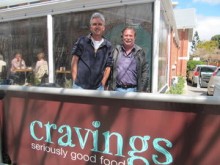 On the 10th of April, my close friend Michael Scott will celebrate his 45th Recovery Birthday.
On the 10th of April, my close friend Michael Scott will celebrate his 45th Recovery Birthday.
Michael lives down the road from me and we see each other regularly. Michael first contacted me back in 2002 when I ran the drug and alcohol news portal Daily Dose. We first met in 2009, not long after I moved to Australia.
Here is a blog post that I first wrote in October 2013, part of a series focused on important factors that facilitate addiction treatment. It is taken from Michael’s Recovery Story, The Power of Empathy and Compassion.
‘I made the decision to stop drinking on April 10th, 1978, three years after my parents had died. My last drinking session took place at the Shenton Park Hotel. I finished my last drink and slammed the glass down, saying to myself that this was it! “No more drinking!” I have not had a drop of alcohol since then.

 This blog post is taken from part of a chapter in my recent eBook
This blog post is taken from part of a chapter in my recent eBook 





